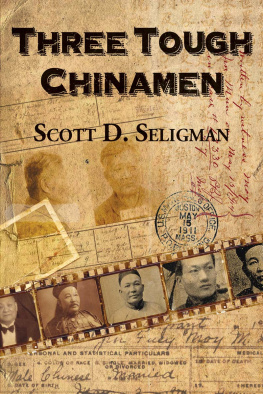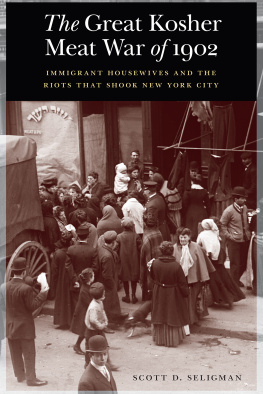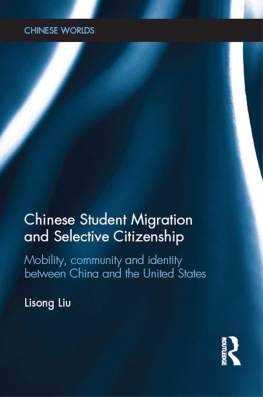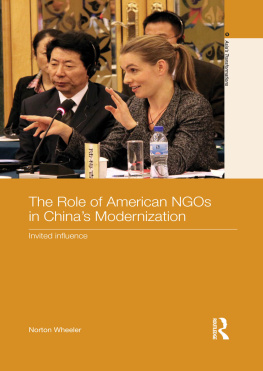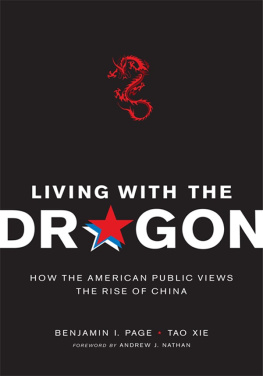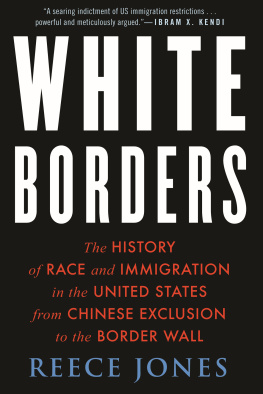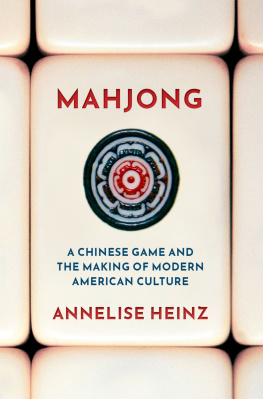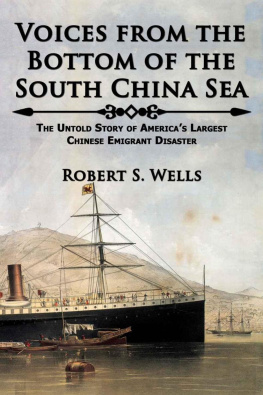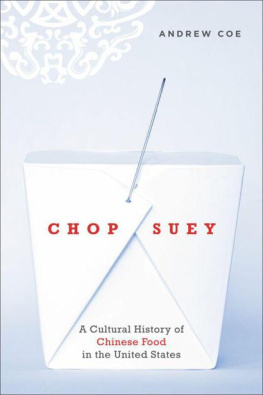Scott D. Seligman - Three Tough Chinamen
Here you can read online Scott D. Seligman - Three Tough Chinamen full text of the book (entire story) in english for free. Download pdf and epub, get meaning, cover and reviews about this ebook. year: 2012, publisher: Earnshaw Books, genre: Non-fiction. Description of the work, (preface) as well as reviews are available. Best literature library LitArk.com created for fans of good reading and offers a wide selection of genres:
Romance novel
Science fiction
Adventure
Detective
Science
History
Home and family
Prose
Art
Politics
Computer
Non-fiction
Religion
Business
Children
Humor
Choose a favorite category and find really read worthwhile books. Enjoy immersion in the world of imagination, feel the emotions of the characters or learn something new for yourself, make an fascinating discovery.
- Book:Three Tough Chinamen
- Author:
- Publisher:Earnshaw Books
- Genre:
- Year:2012
- Rating:5 / 5
- Favourites:Add to favourites
- Your mark:
- 100
- 1
- 2
- 3
- 4
- 5
Three Tough Chinamen: summary, description and annotation
We offer to read an annotation, description, summary or preface (depends on what the author of the book "Three Tough Chinamen" wrote himself). If you haven't found the necessary information about the book — write in the comments, we will try to find it.
Hemmed in by prejudice and restrictive laws, Chinese Americans lived in a defensive crouch at the turn of the 20th century. This is the true story of three scrappy and ambitious brothers who fought hard for their share of the American dream. Activists who rose to prominence and spoke out against injustice, these men made waves and broke barriers; they defied laws to defend their interests and tore down the walls that separated them from the rest of society. Exciting and informative, this history weaves the tale of Chinese immigrants with the larger relationship between China and the United States during that time.
Three Tough Chinamen — read online for free the complete book (whole text) full work
Below is the text of the book, divided by pages. System saving the place of the last page read, allows you to conveniently read the book "Three Tough Chinamen" online for free, without having to search again every time where you left off. Put a bookmark, and you can go to the page where you finished reading at any time.
Font size:
Interval:
Bookmark:
Note: The author uses the term Chinamen in the title advisedly, fully aware that in current parlance it is considered a derogatory term. At the turn of the twentieth century, however, it was used by Chinese and non-Chinese alike as a descriptive word for Chinese man, in the same vein as Englishman and Frenchman, and did not necessarily bear any negative connotation. It is solely in this historical context that the word is employed.
THREE TOUGH CHINAMEN
By S COTT D. S ELIGMAN
ISBN-13: 978-988-16162-3-4
2012, Scott D. Seligman
All rights reserved. No part of this book may be reproduced in material form, by any means, whether graphic, electronic, mechanical or other, including photocopying or information storage, in whole or in part. May not be used to prepare other publications without written permission from the publisher.
Published by Earnshaw Books Ltd. (Hong Kong).
In which Moy Jin Kee and his wife Chin Fung, American citizens returning after a trip to China, are detained in Tacoma, Washington by immigration authorities pending an investigation of their right to be admitted.
In which the confluence of events behind the great Chinese Diaspora, the conditions leading to Americas exclusion of Chinese, and the practicalities of enforcing Chinese exclusion are considered.
In which the history of the Moy family of Duanfen and the early life of the Moy brothers is presented.
In which Jin Kee and Jin Mun make the voyage to California, meet the Leland Stanfords and return to China to marry and in which Jin Mun prospects old claims and works for the railroad.
In which Jin Fuey arrives in America and he and Jin Kee move to New York, where Jin Kee speaks out against the Chinese Exclusion Act, opens a mission and get arrested for larceny.
In which Jin Fuey is sent to seminary and medical school, elopes, adopts a daughter, works in a Chinese hospital and takes a job with a church.
In which Jin Mun reports a shipment of contraband opium, gets cheated out of his reward, translates regulations requiring all Chinese to register with the government, receives death threats and smokes opium in open court.
In which Jin Kee brings his wife from China, opens a hotel, relocates to Chicago, doggedly pursues naturalization and becomes active in a movement to secure rights for the Chinese in America.
In which Jin Fuey speaks out against an anti-Chinese bill, joins the Immigration Bureau, purchases a New Jersey farm. is accused of smuggling and is discharged from the Service.
In which Jin Mun is ill-treated by a gang of boys, is the defendant in a lawsuit for non-payment of rent, allegedly loses three sons in the San Francisco earthquake and returns to mining.
In which Jin Kee relocates to Indianapolis and obtains citizenship, receives a gift from Viceroy Li Hung Chang, hosts Prince Pu Lun and is elevated to the Chinese titled elite.
In which Jin Kee is named to lead the struggle against the Chinese Exclusion Act, visits Washington and meets the Vice President and the President.
In which Gop Jung joins the Immigration Bureau even as his cousin Jin Fuey is discharged, succeeds in importing his wife and son from China, and accuses Jin Mun of extortion.
In which Jin Fuey is tried in Boston for allegedly smuggling Chinese into the United States.
In which Jin Kee is ousted from his position and stripped of his rank, returns to China and is detained and nearly denied re-entry upon his return.
In which Jin Kee opines about the future of Chinese queues, loses his citizenship, dies, is mourned and is taken back to China by his wife for burial.
In which Gop Jung is investigated by the U.S. Immigration Bureau for violating his oath of office and Jin Fuey is interrogated and suspected of having turned him in.
In which Josephine Moy becomes a vaudeville and silent film star, Josephine and Hattie Moy apply for passports, and Jin Fueys origins are investigated.
In which Jin Fuey relocates to Pittsburgh, is arrested three times for mail fraud and dealing in narcotics, is the respondent in one Supreme Court case and the petitioner in another.
In which Jin Fuey serves nearly two years in the Federal penitentiary, is released and dies.
In which Jin Mun leads the Six Companies, participates in the General Peace Association, travels widely in support of efforts to quell triad violence, is ruined in the stock market crash and dies.
My acquaintance with the Moy brothers, who lived more than a century ago, is the happy result of modern technology. Digitization and optical character recognition software have made many old newspapers easily and efficiently searchable online. I found my way to the Moys by browsing turn-of-the-century editions of the Washington Post. Looking to learn about the history of Washington, DCs tiny Chinatown, I happened on the story of a Chinese immigrant named Moy Gop Jung, who held positions from laundryman and Sunday school teacher to detective and constable, helped the police track down Chinese troublemakers and attempted unsuccessfully to wed a Caucasian woman in the District of Columbia. The Post declared him one of the most interesting men employed in Uncle Sams service.
Moy Gop Jung was interesting, and he got even more so when I found, on the Ancestry.com website, a 925-page case file about him from the U.S. Immigration Bureaus Chinese Exclusion Act collection. He worked as an interpreter for the Bureau until being accused of a litany of offenses, including perjury, smuggling illegal immigrants into the United States and selling classified information. He was also, as it turned out, a bigamist.
In perusing the file about his investigation - which unfolded like a Perry Mason mystery - I was introduced to several of his relatives, and discovered that as remarkable as Moy Gop Jungs story was, those of three brothers he called his uncles were even more so. There was Moy Jin Kee (1847-1914), who spoke out eloquently against the Chinese Exclusion Act, opened a Methodist mission in the heart of New Yorks Chinatown and became a key figure in the American Chinese communitys efforts to lobby for the rights of citizenship. Jin Kees brother, Moy Jin Mun (1851-1936) was a protg of Leland Stanford, a prospector in the California Gold Rush, a dabbler in the opium trade and for a time the leader of the Six Companies, the most powerful Chinese organization in America. And most interesting of all was Jin Fuey Moy (1862-1924), a physician who was arrested several times for drug-related offenses, was the subject of two Supreme Court cases that helped shape early federal efforts to regulate narcotics and are cited frequently to this day, and who served two years in the Atlanta Penitentiary for his crimes.
And so while Moy Gop Jung will make a couple of appearances in this work, it is principally a book about his uncles - or more precisely, his first cousins, once removed.
When my grandfather, Abraham Seligman, emigrated to the United States from Byelorussia (now Belarus) in 1905, the Moy brothers had already been in America for at least a quarter of a century; in the case of Moy Jin Kee, it had been nearly twice that length of time. They spoke better English than he did. But as soon as Abe had cleared Immigration at Ellis Island, he enjoyed far more freedoms than the Moys ever were permitted in their many decades in the same country.
Abe endured his share of hardships, to be sure, but he wasnt required to carry a residence permit that proved his right to be in the United States, and didnt risk prison or deportation if he failed to produce valid identification. He was free to return to Europe if he wished and then turn around and come back to America, and would face no intensive grilling from an Immigration official demanding to know how many rows of houses there were in his native village, or the names and birth order of his fathers brothers. He could pick a wife from an already large population of Jewish women in America or, if he preferred, from among the many who continued to flow into New York harbor every day. Congress had passed no law that effectively barred the entry of women from Europe on the presumption that they probably intended to work as prostitutes, as it had done with Asian women.
Next pageFont size:
Interval:
Bookmark:
Similar books «Three Tough Chinamen»
Look at similar books to Three Tough Chinamen. We have selected literature similar in name and meaning in the hope of providing readers with more options to find new, interesting, not yet read works.
Discussion, reviews of the book Three Tough Chinamen and just readers' own opinions. Leave your comments, write what you think about the work, its meaning or the main characters. Specify what exactly you liked and what you didn't like, and why you think so.

